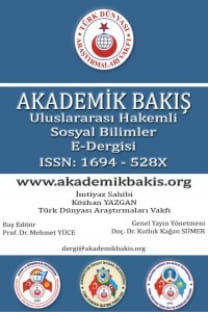FARABİ’NİN SİYASET FELSEFESİ ÜZERİNDEN CUMHURBAŞKANLIĞI HÜKÜMET SİSTEMİ
Farabi, 9. ve 10. yüzyıllarda yaşamış İslam dünyası kökenli bir Türk filozofudur. Farabi’nin siyaset felsefesi üzerinden yaptığı değerlendirmeler dikkate alındığında bugünün devlet başkanlığı modeline ait görüşleri öne çıkarılabilir.
Anahtar Kelimeler:
Farabi, Siyaset, Siyaset Felsefesi, Devlet Başkanlığı Modeli, Cumhurbaşkanlığı Hükümet Sistemi
THE PRESIDENTIAL GOVERNMENT SYSTEM ON FARABI’S POLITICAL PHILOSOPHY
Farabi is a Turkish philosopher who lived in the 9th and 10th centuries and is of Islamic origin. Considering Farabi's evaluations of political philosophy, the opinions on the presidential model of today can be emphasized.In this sense, Farabi's perception of the presidential model seems to be similar to the presidential government system that will be implemented in our country. It can be said that the different points are not from the President and the system but from the preference of the aristocracy-democracy management model. Farabi put forward the aristocracy as a model of good governance. However, with the Presidential government system, democratic elements and ideally democracy are being emphasized.In this respect, in the study, Farabi's political philosophy was explained by his view on the presidential model was considered. Also, the model of the presidential system, which is practiced in our country under the name of the Presidential government system, was examined. As a result of the study, it is discussed how the Presidential Office, members of the cabinet, bureaucrats, bureaucracy and public personnel can gain corporate identity in the new structure.
Keywords:
Farabi, Policy, Political Philosophy, The Presidential Model, Presidential Government System,
___
Arslan, A. (1999). Felsefeye Giriş. Dördüncü Baskı. Ankara: Vadi Yayınları: 116. Demirel, D. (2014). Farabi’nin İdeal Devleti: Erdemli Şehir. Niğde Üniversitesi İİBF Dergisi. Cilt:7, Sayı:1, s.358-369. Erdoğan, M. (1990). Farabi’nin Siyaset Felsefesi Üstüne. Türkiye Günlüğü. N.11 (Yaz), s.72-80. Göze, A. (2000). Siyasal Düşünceler ve Yönetimler. İstanbul: Beta Basım A.Ş. Yayın No:515. Kapani, M. (2000). Politika Bilimine Giriş. Onikinci Basım. Ankara: Bilgi Yayınevi: 46/2. Korkut, Ş. (2005). Farabi’nin Siyaset Felsefesinin Temel Problemleri ve Kökenleri. Ankara Üniversitesi Sosyal Bilimler Enstitüsü Felsefe ve Din Bilimleri (İslam Felsefesi) Ana Bilim Dalı. Yayımlanmamış Doktora Tezi. Ankara. Yılmaz, M. (2005). Platon ve Farabi’nin Ütopik Devlet Anlayışlarının Karşılaştırılması. Dicle Üniversitesi. Sosyal Bilimler Enstitüsü Felsefe Ana Bilim Dalı. Yayımlanmamış Doktora Tezi. Diyarbakır. İnternet Kaynakları: Bülbül, K. (2017). Küreselleşme Perspektifinden Cumhurbaşkanlığı Modeli: Türkiye ve Bölgesel Dengeler. Cumhurbaşkanlığı Sistemi Ekseninde Yeni Türkiye’nin Siyasi, İdari ve Sosyolojik Kodları Paneli. Türkiye Uluslararası Siyasal ve Stratejik Araştırmalar Merkezi (TUSSAM). http://tussam.org/index.php/etkinlikler/panel/item/107-panel-cumhurbaskanligi-sistemi-ekseninde-yeni-turkiye-nin-siyasi-idari-ve-sosyolojik-kodlari.html, 09.05.2018. Durgun, G.B. (2017). Yürütme Fonksiyonu Bakımından Cumhurbaşkanlığı Sisteminin Analizi. Cumhurbaşkanlığı Sistemi Ekseninde Yeni Türkiye’nin Siyasi, İdari ve Sosyolojik Kodları Paneli. Türkiye Uluslararası Siyasal ve Stratejik Araştırmalar Merkezi (TUSSAM). http://tussam.org/index.php/etkinlikler/panel/item/107-panel-cumhurbaskanligi-sistemi-ekseninde-yeni-turkiye-nin-siyasi-idari-ve-sosyolojik-kodlari.html, 08.05.2018. http://www.star.com.tr/politika/cumhurbaskani-erdogan-deik-genel-kurulunda-konusuyor-haber-1334313/, 03.05.2018. http://www.turkiyegazetesi.com.tr/politika/553302.aspx, 04.05.2018. Uzun, C.D. (2017). Fesih Tartışmaları ve Cumhurbaşkanı’nın TBMM Seçimlerini Yenilemesi. https://www.sabah.com.tr/yazarlar/perspektif/cem-duran-uzun/2017/04/01/fesih-tartismalari-ve-cumhurbaskaninin-tbmm-secimlerini-yenilemesi, 09.05.2018.- Başlangıç: 2004
- Yayıncı: Akademik Bakış
Sayıdaki Diğer Makaleler
MESLEK YÜKSEKOKULU ÖĞRENCİLERİNİN ONLİNE ALIŞVERİŞ FAALİYETLERİNİN İNCELENMESİ
POLİTİK BECERİ ve KARİYER TATMİNİ İLİŞKİSİ: BİR ALAN ÇALIŞMASI
Semih KOÇMAR, Agâh Sinan ÜNSAR, Adil OĞUZHAN
FARABİ’NİN SİYASET FELSEFESİ ÜZERİNDEN CUMHURBAŞKANLIĞI HÜKÜMET SİSTEMİ
SÖMÜRGENİN GÜCÜ MODERN DEVŞİRMELER VE DÖNEKLER
MAHMUD TÂÎ BİN MUHAMMED’İN(v.1268/1851) ŞERH-İ GÜLİSTÂN’I
TOSYA’DA PİRİNÇ ÜRETİMİNİN DÜNÜ, BUGÜNÜ VE GELECEĞİ
ÜLKELERİN TURİZMDE TANITMA AMAÇLI KULLANDIKLARI SLOGANLARIN DEĞERLENDİRİLMESİ
Yusuf AYMANKUY, Şimal AYMANKUY, İrem Ceylan KARAGÖZ
ORTAOKUL ÖĞRENCİLERİNİN PSİKOLOJİK SAĞLAMLIKLARININ BAŞA ÇIKMA STRATEJİLERİ AÇISINDAN İNCELENMESİ
